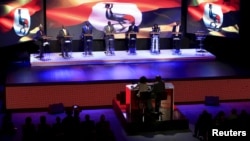The Inter-Religious Council of Uganda says the last presidential debate ahead of the February 18 general election will proceed as planned on February 13, despite local media reports that incumbent President Yoweri Museveni will not be available to participate.
IRCU officials said they were negotiating with the governing National Resistance Movement to try to ensure that Museveni is part of the debate.
The debate, they said, is aimed at giving voters the chance to decide which candidate presents the best policy options for resolving the country's challenges. The discussion will cover foreign policy, regional integration, peace and security, and international trade and investment. All eight presidential candidates have been invited to take part.
Joshua Kitakule, secretary general of the IRCU, said his organization received positive feedback after the first debate, which led to its decision to organize one more debate. VOA’s Shaka Ssali is expected to be one of the moderators.
“Seven candidates have confirmed their participation, and plans are under way to reach the eighth candidate. Hopefully, by the end of tomorrow or Monday, we should have reached the eighth candidate and we are praying that the eighth candidate also confirms his participation in the debate,” Kitakule said.
“Ours is a platform given to the presidential candidates to take advantage of. It is nonpartisan; it is impartial; it’s an independent space," he said. "So it is not a space where we are forcing anybody to come. Any candidate that finds value, that finds benefits from it will definitely come to that debate. ... We are trying to negotiate with [Museveni] so that he is able to find benefits to take advantage of this space.”
Citizens felt deprived
Ugandans expressed dissatisfaction with Museveni’s decision to skip the first debate. They said it deprived them of the opportunity to hear from the leader, who has been in power for the last 30 years.
Critics said the debate did not meet expectations because Museveni was not there to answer pointed questions, including why he wants another mandate after being in power for so long.
Local media later quoted him as saying he participated in debates when he was in primary and secondary schools. His statement led opposition and civil society groups to accuse him of showing disrespect to voters by refusing to be held accountable for his leadership and to outline his plans for improving citizens' lives.
Kitakule said Ugandans were excited about and were "looking forward to the second debate. Why? Because they find value when the leaders who are offering themselves are able to come together, share the same platform to talk about what they want to do for this country at the same time. So it is exciting."
Critics also said some Ugandans were left out because the debate was conducted only in English, with no translation into some of the local dialects, despite promises by organizers to do so.
“What we are doing is to make sure that this time round we get another television [station] that would broadcast this debate through translation into vernacular into Luganda, which is spoken widely in this country,” Kitakule said.




